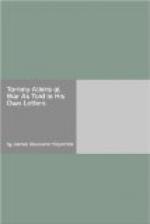The Highlanders have been great favorites in France. Their gaiety, humor and inexhaustible spirits under the most trying conditions have captivated everybody. Through the villages on their route these brawny fellows march with their pipers to the proud lilt of “The Barren Rocks of Aden” and “The Cock o’ the North,” fine marching tunes that in turn give place to the regimental voices while the pipers are recovering their breath. “It’s a long way to Inveraray” is the Scotch variant of the new army song, but the Scots have not altogether abandoned their own marching airs, and it is a stirring thing to hear the chorus of “The Nut-Brown Maiden,” for instance, sung in the Gaelic tongue as these kilted soldiers swing forward on the long white roads of France.
A charming little letter published in The Times tells how the Highlanders and their pipers turned Melun into a “little Scotland” for a week, and the enthusiastic writer contributes some verses for a suggested new reel, of which the following have a sly allusion to the Kaiser’s order for the extermination of General French’s “contemptible little army”:
“What! Wad ye stop
the pipers?
Nay, ’tis
ower soon!
Dance, since ye’re dancing,
William,
Dance, ye puir
loon!
Dance till ye’re dizzy,
William,
Dance till ye
swoon!
Dance till ye’re deid,
my laddie!
We play the tune!”
This is all quite in the spirit of the Highland soldiers. A Frenchman, writing to a friend in London goes into ecstasies over the behavior of the Scots in France, and says that at one railway station he saw two wounded Highlanders “dancing a Scotch reel which made the crowd fairly shriek with admiration.” Nothing can subdue these Highlanders’ spirits. They go into action, as has already been said, just as if it were a picnic, and here is a picture of life in the trenches at the time of the fierce battle of Mons. It is related by a corporal of the Black Watch. “The Germans,” he states, “were just as thick as the Hielan’ heather, and by weight of numbers (something like twenty-five to one) tried to force us back. But we had our orders and not a man flinched. We just stuck there while the shells were bursting about us, and in the very thick of it we kept on singing Harry Lauder’s latest. It was terrible, but it was grand—peppering away at them to the tune of ‘Roamin’ in the Gloamin’’ and ‘The Lass o’ Killiecrankie.’ It’s many a song about the lassies we sang in that ‘smoker’ wi’ the Germans.”
According to another Highlander “those men who couldn’t sing very well just whistled, and those who couldn’t whistle talked about football and joked with each other. It might have been a sham fight the way the Gordons took it.” With this memory of their undaunted gaiety it is sad to think how the Gordons were cut up in that encounter. Their losses were terrible. “God help them!” exclaims one writer. “Theirs was the finest regiment a man could see.”




